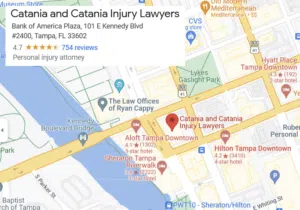
Your body moves with a lot of speed when you are riding in a car. If your car decelerates or accelerates quickly in a car accident, your body wants to keep moving at the same speed. Your seat or seat belt pushes or pulls your body to match the changing speed of the car.
But your safety restraints do not hold your head. Your neck bends and cracks like a whip as your head snaps back and forth. This can cause a whiplash injury.
Here is a helpful guide to whiplash injuries and the compensation you can seek for their effects.
Table of Contents
How Do Whiplash Injuries Happen?
Whiplash happens in accordance with the laws of motion: A body in motion tends to stay in motion unless acted upon by an outside force.
When your vehicle travels at 25 miles per hour, your body also travels at 25 miles per hour. When your vehicle stops, your body also stops. If your car gently decelerates from 25 miles per hour to a stop, the friction of your seat is enough to slow your body.
But when your car decelerates quickly in a crash, your body needs a stronger force to slow it down. If nothing stops your body, you risk bouncing around the passenger compartment or even being ejected from the vehicle.
Florida, like 48 other states, has a seat belt law. Under Florida’s seat belt law, drivers and front-seat passengers must wear a seat belt. Rear-seat passengers under the age of 18 must also wear a seat belt.
Vehicle occupants wearing a seat belt will avoid many of the worst injuries in a car accident. But hitting the seat belt puts an enormous strain on your neck as your head whips forward.
Seat belts are not the only cause of whiplash. Hitting anything in the car can cause whiplash. If your body hits the dashboard, steering wheel, or seat, your neck will experience the same strain as it pulls your head to stop with your body.
You can also get whiplash in other accidents. A fall from an elevation or a slip and fall accident can cause whiplash as your body stops before your head hits. You can also experience whiplash from the force of a car hitting you in a pedestrian accident or bicycle accident.
What Are the Symptoms of a Whiplash Injury?
A mild case of whiplash will strain the muscles and tendons of the neck. It may also stretch or tear the ligaments that hold the skull to the spine.
Symptoms from a mild whiplash injury might include:
- Muscle pain and soreness
- Inflammation
- Headaches
- Decreased range of motion
Mild cases of whiplash usually require rest, ice, and anti-inflammatory medicine. Depending on the severity of the tissue damage, a doctor might also prescribe physical therapy.
Severe cases of whiplash could result in much more serious symptoms. When the head whips forward or backward, the neck hyperextends. When the head snaps back into place, the force can damage the vertebrae and discs in the neck. This can result in:
Fractured Vertebrae
Each vertebra includes a body and wing-shaped processes. The space between the body and the processes contains the spinal cord.
If the vertebral body fractures, bone fragments can enter the spinal canal and sever or compress the spinal cord.
Compressed Discs
The spine contains discs between the vertebrae. The discs include a gel-like interior surrounded by a fibrous exterior. These discs cushion the spine and provide flexibility.
Whiplash can crush the discs. When the discs compress, they can bulge or leak. The compressed discs can protrude into the spinal canal and sever or compress the spinal cord.
Spinal Cord Injury
Spinal cord injuries can result when something interferes with the nerves that connect the brain to the body. When the nerves cannot carry signals between the brain and body, you can experience serious symptoms, including:
- Paralysis
- Pain
- Numbness or tingling
- Loss of sensation
- Loss of coordination
- Muscle weakness
- Loss of bowel or bladder control
What Are Some Injuries Related to Whiplash?
The same forces that cause whiplash can cause other injuries as well, including:
Contusions
A contusion is a brain injury where your brain hits the inside of your skull. The impact can cause the brain to bruise and bleed. The bleeding and the swelling from the bruise can cut off circulation to the brain. Contusions can have severe consequences, including coma or death.
Diffuse Axonal Injuries (DAI)
The same whipping forces that cause whiplash can also damage brain tissue. A DAI happens when the long fibers that connect neurons in the brain tear. As a result, brain cells cannot communicate. This often leaves victims comatose.
Concussion
Doctors call concussions “mild brain injuries” because they rarely cause death. But the whipping forces that cause whiplash can create pressure on the brain. This pressure damages brain cells and causes the brain to inflame.
Symptoms of a concussion can include:
- Confusion
- Memory loss
- Loss of coordination
- Blurred vision or seeing stars
- Tinnitus
- Headaches
Symptoms of a concussion usually clear up in six to eight weeks. If your symptoms last longer than two months, you might have post-concussion syndrome.
What Compensation Can I Recover for a Whiplash Injury?
Florida’s no-fault insurance system requires you to seek car accident compensation from your auto insurer rather than filing a lawsuit. The only exceptions occur if you suffer a serious and permanent injury or your medical expenses exceed your policy limits.
You will probably not exceed the $10,000 no-fault limits for a minor case of whiplash. But if you suffered a severe case of whiplash that caused a permanent neck or spinal cord injury, you might fall into one of the exceptions.
Similarly, if the whipping forces also caused a brain injury, Florida might excuse you from the no-fault system.
When you meet one of the exceptions, you can file a lawsuit to seek economic and non-economic damages, such as:
- Past and future medical expenses
- Lost income
- Diminished earning capacity
- Pain and suffering
You can also seek compensation through a lawsuit if your whiplash occurred due to an accident that did not involve a vehicle.
Contact a Tampa Personal Injury Lawyer for Help
If you’ve been faced with whiplash or another injury in an accident, a skilled legal professional can help you to explore your options for compensation. To learn more about the compensation you can seek for your whiplash injury, contact Catania & Catania, P.A. or call (813) 222-8656 for a free consultation.




